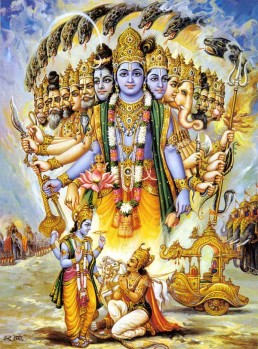Swami Chinmayananda
Swami Chinmayananda Commentary
Explaining why Arjuna deserves a special congratulation for having gained this extraordinary experience, the Lord says that none can ‘SEE’ this Universal-Form merely because of one’s study of the Vedas, or on the strength of one’s sacrifices. Nor can one gain it by the merits gained through the distribution of gifts, or through performing rituals, or even through constant practice of severe austerities. These are, no doubt, necessary and always helpful in preparing the seeker to realise the essential unity beneath the perceived plurality, but neither a mere book-study, nor empty ritualism, nor physical tapas in themselves will, as an effect of them, bring about this understanding and the Final Experience. It can come only when the mind is steady. This “Vision” can be illumined only in the clear light of an integrated ‘in-turned intellect.’
In thus making light of the study of the Vedas, performance of sacrifices, distribution of gifts, practice of rituals and a life of grim penance, Lord Krishna should not be misunderstood as ridiculing these great prescriptions of the Vedas. He merely means to say that although these are means, preparatory to the final end, they are not to be confused with the goal. Cooking, in itself, cannot appease hunger, but that does not mean that cooking is unnecessary; after cooking there is, and must be, the eating. It is in this sense that we must understand the stanza, criticising ponderous study and futile efforts of misguided enthusiasts.
FOR, NONE OF THE KNOWN METHODS OF SELF-DEVELOPMENT IS CAPABLE OF PRODUCING THIS GLORIOUS ACHIEVEMENT. IT IS SAID:
Adi Sankara Commentary
Na veda-yajna-adhyayanaih, not by the study of the Vedas and sacrifices, (i.e.) not by the methodical study of even the four Vedas and the study of the sacrifices-since the study of the sacrifices is achieved by the very study of the Vedas, the separate mention of the study of sacrifices is for suggesting detailed knowledge of sacrifices; [This separate mention of the study of sacrifices is necessary because the ancients understood the study of Vedas to mean learing them by rote.] so also, na danaih, not by gifts-in such forms as distributing wealth equal to the weight of the giver; na ca kriyabhih, not even by rituals-by Vedic and other rituals like Agnihotra etc.; nor even ugraih tapobhih, by severe austerities such a Candrayana [A religious observance or expiatory penance regulated by the moon’s phases. In it the daily quantity of food, which consists of fifteen mouthfuls at the full-moon, is curtailed by one mouthful during the dark fornight till it is reduced to nothing at the new moon; and it is increased in a like manner during the bright fortnight.-V.S.A.] etc. which are frightful; sakyah aham, can I; evam rupam, in this form-possessing the Cosmic form as was shown; drastum, be perceived; nrloke, in the human world; tvad-anyena, by anyone other than you; kuru-pravira, O most valiant among the Kurus.
The Bhagavad Gita with the commentary of Sri Sankaracharya – Translated by Alladi Mahadeva Sastry
Holy Geeta – Commentary by Swami Chinmayananda
The Bhagavad Gita by Eknath Easwaran – Best selling translation of the Bhagavad Gita
The Bhagavad Gita – Translation and Commentary by Swami Sivananda
Bhagavad Gita – Translation and Commentary by Bhaktivedanta Swami Prabupadha
Srimad Bhagavad Gita Chapter 11 – Verse 48 – 11.48 na vedayajnadhyayanairna – All Bhagavad Gita (Geeta) Verses in Sanskrit, English, Transliteration, Word Meaning, Translation, Audio, Shankara Bhashya, Adi Sankaracharya Commentary and Links to Videos by Swami Chinmayananda and others – 11-48

